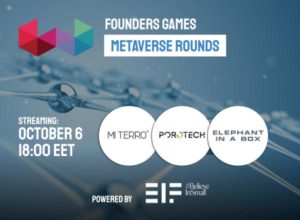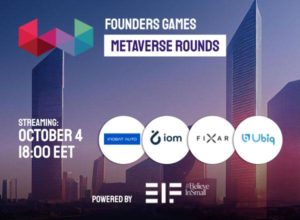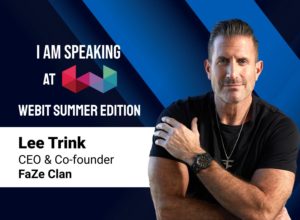Metaverse Rounds Episode 5: Financial technologies, DeFi Pitch
re you ready for the next epic episode of Founder's Games Metaverse Rounds? 🚀
Today's episode, brought to you by EIF, is all about Fintech and DeFi.
👋 Join us as we watch these amazing startup leaders steal the spotlight. 🌟
Gaston Irigoyen, CEO, Pomelo
JacekFigula, Chief Commercial Officer, Billon
Sandra Nolasco, CEO, Twinco Capital
➡️ Meet our incredible panel of judges:
Max Bautin, Co-founder & Managing Partner, IQ Capital
Aleksandra Laska, Partner, Redalpine Venture Partners
Marcin Laczynski, Partner, Next Road Capital
Alexander Galitsky, Almaz Capital
Plamen Russev, Ph.D, of Webit Investment Network
🎯 Founders Games, powered by the European Investment Fund (EIF), proudly endorses and grants investment awards of up to $6 million to the most rapidly expanding scaleups that drive positive societal and environmental change.
🌎 Founders Games stands as the sole global platform harnessing the collective intelligence of over 250 investors. Late-stage VCs, family offices, corporate VCs, and private investors diligently evaluate and rate the companies that navigate through 5 rounds of rigorous selection. The competition welcomes companies from 17 industry verticals, spanning from seed to Series C stages.
📅 Save the date! Set your alarms for 6:00 pm EET and make sure you don't miss out on this fantastic opportunity. 📅 Tune in here:
https://www.foundersgames.org/2023/event-2023-10-fintech.php
The Founders Games and the TV series are trademarks and intellectual properties of Webit Foundation - all rights reserved.
🌟🚀 #FoundersGames #MetaverseRounds #EIF
GROW@COP – Sustainable Innovation Startup Challenge during COP28 in Dubai
🚀The COP28 Presidency of the United Nations has chosen and invited Webit to showcase global innovations aimed at addressing climate challenges. The forum will culminate in a special Webit ceremony called GROW@COP, to be held at the COP28 Presidency Conference Center.
✨ During this ceremony, Webit will announce the top 5 companies (selected through the five rounds of Founders Games) that have the potential to contribute significantly to finding global solutions. Webit is the founder of the global innovation program and platform known as Founders Games.
👉 This recognition, coming from the highest level, for our impact on innovation and sustainable development, is perhaps one of the most significant moments in Webit's history and is bestowed by the most important global organization.
🤝 Webit Foundation, in partnership with UICCA, led by Her Highness Sheikha Shamma personally, will host eight events during COP28 of the United Nations this year. This is further proof of the impact and influence that our global Webit community possesses and serves as an even greater incentive for our team to work towards creating value for our country and the world.
The thematic days of the event during COP28 are as follows:
 HEALTH / RELIEF / RECOVERY AND PEACE
-
Date: December 3rd
Location: Pavilion, Knowledge Hub, Green Zone
HEALTH / RELIEF / RECOVERY AND PEACE
-
Date: December 3rd
Location: Pavilion, Knowledge Hub, Green Zone |
 FINANCE / TRADE / GENDER EQUALITY / ACCOUNTABILITY
-
Date: December 4th
Location: UICCA Location: Pavilion, Knowledge Hub, Green Zone
FINANCE / TRADE / GENDER EQUALITY / ACCOUNTABILITY
-
Date: December 4th
Location: UICCA Location: Pavilion, Knowledge Hub, Green Zone |
 ENERGY / INDUSTRY AND JUST TRANSITION
-
Date: December 5th
Location: Pavilion, Knowledge Hub, Green Zone
ENERGY / INDUSTRY AND JUST TRANSITION
-
Date: December 5th
Location: Pavilion, Knowledge Hub, Green Zone |
 MULTILEVEL ACTION / URBANIZATION AND BUILT ENVIRONMENT / TRANSPORT
-
Date: December 6th
Location: Pavilion, Knowledge Hub, Green Zone
MULTILEVEL ACTION / URBANIZATION AND BUILT ENVIRONMENT / TRANSPORT
-
Date: December 6th
Location: Pavilion, Knowledge Hub, Green Zone |
 FOOD / AGRICULTURE AND WATER
-
Date: December 8th
Location: Pavilion, Knowledge Hub, Green Zone FOOD / AGRICULTURE AND WATER
-
Date: December 8th
Location: Pavilion, Knowledge Hub, Green Zone |
 YOUTH / CHILDREN / EDUCATION AND SKILLS
-
Date: December 8th
Location: Youth Pavilion, Green Zone
YOUTH / CHILDREN / EDUCATION AND SKILLS
-
Date: December 8th
Location: Youth Pavilion, Green Zone |
 NATURE / LAND USE AND OCEANS
-
Date: December 9th
Location: Pavilion, Knowledge Hub, Green Zone
NATURE / LAND USE AND OCEANS
-
Date: December 9th
Location: Pavilion, Knowledge Hub, Green Zone |
 GROW@COP GRAND FINALS GALA CEREMONY
-
Date: December 10th
Location: Main Conference Center of COP28 Presidency GROW@COP GRAND FINALS GALA CEREMONY
-
Date: December 10th
Location: Main Conference Center of COP28 Presidency |
Metaverse Rounds Episode 4: E-commerce and Logistics
🚀 Metaverse Rounds by Founders Games, in partnership with the European Investment Fund (EIF), is advancing to its next episode, centering its discussion on the realms of e-commerce and logistics.
🔥 Join us in witnessing these innovative startup leaders take the stage:
Cyrille Jacques, Co-Founder & Chief Strategy Officer at Chari
Giulia Mena, Co-Founder of ZIM Connections
Joshua Priore, CEO of Worldz
🌟 Our distinguished panel of judges comprises:
Wissam Mansour from Neventa Capital
Riccardo Cirillo from DIP Capital
Louise Hagen representing Luminar Venture
Plamen Russev, Ph.D., of Webit Investment Network
Founders Games, powered by the European Investment Fund (EIF), proudly endorses and grants investment awards of up to $6 million to the most rapidly expanding scaleups that drive positive societal and environmental change.
🌎 Founders Games stands as the sole global platform harnessing the collective intelligence of over 250 investors. Late-stage VCs, family offices, corporate VCs, and private investors diligently evaluate and rate the companies that navigate through 5 rounds of rigorous selection. The competition welcomes companies from 17 industry verticals, spanning from seed to Series C stages.
🕕 Mark your calendars! Tune in at 6:00 pm EET using the link below, and seize this incredible opportunity:
https://www.foundersgames.org/2023/event-2023-10-ecommerce.php
The Founders Games and the TV series are trademarks and intellectual properties of Webit Foundation - all rights reserved.
🌟🚀 #FoundersGames #MetaverseRounds #EIF
Metaverse Rounds Episode 3: New Materials
🚀 Founders Games' Metaverse Rounds, powered by the European Investment Fund (EIF), continues its exciting journey with Episode 3, shining the spotlight on the theme of New Materials.
🔥 Join us as we observe these forward-thinking startup leaders step onto the stage:
Robert Luo, Founder & CEO of Mi Terro
Yingjun Liu, Co-Founder & CTO of Porotech
Daniela Terminel, Co-Founder & CEO of Elephant in a Box
🌟 Our esteemed panel of judges features:
Kurt Kaltenegger, ABB Technology Ventures
Philipp Thurn und Taxis, CNB Capital
Marcel Kloosterman PhD, Brightlands Venture Partners
Dr. Plamen Russev, Webit Investment Network
Founders Games, powered by the European Investment Fund (EIF), proudly endorses and grants investment awards of up to $6 million to the most rapidly expanding scaleups that drive positive societal and environmental change.
Through our bi-annual scaleup challenge, which attracts over 4000 applicants from 140+ countries, we bring together the finest founders, top-tier investors from around the world, corporate leaders, and media to identify and support resilient innovations and impact-driven entrepreneurs on a global scale.
🌍✨
🌎 Founders Games stands as the sole global platform harnessing the collective intelligence of over 250 investors. Late-stage VCs, family offices, corporate VCs, and private investors diligently evaluate and rate the companies that navigate through 5 rounds of rigorous selection. The competition welcomes companies from 17 industry verticals, spanning from seed to Series C stages.
🕕 Mark your calendars! Tune in at 6:00 pm EET using the link below, and seize this incredible opportunity:
https://www.foundersgames.org/2023/event-2023-10-materials.php
The Founders Games and the TV series are trademarks and intellectual properties of Webit Foundation - all rights reserved.
🌟🚀 #FoundersGames #MetaverseRounds #EIF
Metaverse Rounds Episode 2, focusing on Mobility and Urban Tech Vertical
🚀Founders Games' Metaverse Rounds, powered by the European Investment Fund continues with Episode 2, focusing on Mobility and Urban Tech Vertical! 🚗
🔥 Join us to witness these innovative startups take the stage:
Boyd Cohen, CEO of Iomob
Marian Bocek, CEO of Inobat
Yulia Druzhnikova, Co-Founder of FIXAR
Raffaele Giaquinto, COO of Ubiq
🌟 Our incredible jury includes:
Rinat Yogev, GM Ventures (General Motors Ventures)
Alexander Galitsky, Almaz Capital
Max Filippov, GR Capital
Dr. Plamen Russev, Webit Investment Network
Founders Games powered by European Investments Fund endorses and awards with up to $6M investment award the fastest growing scaleups generating societal and environmental change.
Through a bi-annual scaleup challenge gathering 4000+ applicants from 140+ countries, the platform brings together the best founders, the world's top investors, corporate leaders and media to identify and support resilient innovations and impact entrepreneurs globally.
🌍✨
🌎Founders Games is the only global platform powered by the collective intelligence of over 250 investors. Late stage VCs, family offices, corporate VCs and private investors screen through and score the companies which go through 5 rounds of selection. The competition welcomes companies in 17 industry verticals ranging from seed to Series C stages.
🕕 Save the date! Tune in at 6:00 pm EET with the link below and don't miss this incredible opportunity:
https://www.foundersgames.org/2023/event-2023-10-mobility.php
🌟🚀 #FoundersGames #MetaverseRounds #InnovationUnleashed
🚀 Exciting News! Introducing the Founders Games Metaverse Project 🌐
Are you ready to embark on a journey into the boundless world of the metaverse? We're thrilled to announce the launch of the Founders Games Metaverse Project powered by European Investment Fund, where we're bridging the gap between the real world and the metaverse to explore the pinnacle of human potential and technology.
🌎 Our very first episode is coming your way, featuring the Cleantech vertical! Here's a sneak peek of our fantastic lineup:
🚀 Startups pitching on stage:
- Jurgen Van Leeuwen, Global Head of Growth at Airly
- Steve Meller, CEO of CH4 Global
- Ido Sella, CEO of ECOncrete
- Sergey Ogorodnov, CEO of Voltaware
🌟 And that's not all! We've got an amazing jury ready to score these innovative pitches:
- Dr. Michael Hoeck, EarlyBird
- Marie-Helene Ametsreiter, Speedinvest
- Florian Erber, Ananda Impact Ventures
- Thomas Bigagli, Plug & Play Tech Center
- Dr. Plamen Russev, Webit Investment Network
🎉 Get ready for some inspiring cleantech solutions and intense competition! Stay tuned for the action-packed episode! 📺🌱
Every week, we'll bring you a captivating showcase of remarkable technologies that are pushing the boundaries of innovation. Get ready to witness a revolution as we unveil exclusive insights into cutting-edge ideas and groundbreaking technologies that are reshaping entire industries!
Join us on this incredible journey where the real world meets the metaverse, and human potential meets technology. Stay tuned for updates, sneak peeks, and the latest from the Founders Games Metaverse Project powered by European Investment Fund.
#FoundersGamesMetaverseProject #CleantechInnovation #StartupShowdown #StayTuned
Link to stream:
https://www.foundersgames.org/2023/event-2023-10-cleantech.php
Speaking at Webit: Lee Trink, CEO & Co-founder FaZe Clan
🎉💥 With only a week to go before Webit, we are thrilled to announce the phenomenal Lee Trink is joining our speaker lineup!
Why I shoud not miss his speech?
As the CEO and co-founder of FaZe Clan, the largest and most followed esports and gaming organization globally, Trink possesses unparalleled industry expertise. His deep understanding of the esports landscape, coupled with his extensive experience in entertainment and brand building, makes his insights highly valuable. By attending his speech, you have the opportunity to tap into his wealth of knowledge and gain a comprehensive understanding of the esports industry's current trends and future directions.
What will I learn?
As an industry leader, Trink's speech will touch upon the future trends, advancements, and opportunities in esports. You can gain insights into emerging technologies, evolving audience preferences, and the potential impact of AI, virtual reality, and other technologies on the esports landscape. This knowledge can help you stay informed and make informed decisions in your own esports-related endeavors.
Read more about him
Lee Trink is an entrepreneur in the entertainment and media industries focused on the convergence of gaming and entertainment as both a cultural movement and an explosive business. As the CEO and co-owner of FaZe Clan, the largest, most followed esports and gaming organization in the world, he is creating a brand that extends beyond esports to mainstream entertainment through content, collaborations and e-commerce.
⚡️ Trink began his career as an Assistant District Attorney in Brooklyn. With a true passion for music and a creative business mind, he sought an opportunity to bridge his legal background with entertainment. It’s at that moment he began his illustrious career moving through the ranks to eventually lead some of the most well-known music labels in the world.
🎵 In 2001, Trink served as General Manager for artist-first label Lava Records. He went on to lead Virgin Records as General Manager and COO with much success, ultimately resulting in his promotion to President of EMI’s Capitol Music Group. He launched the careers of global superstars such as Katy Perry and Jared Leto’s 30 seconds to mars, along with architecting global marketing campaigns for The Rolling Stones, Coldplay, and Lenny Kravitz, among others.
Following his tenure at EMI, Trink built his own business where he managed multi-platinum global recording artists such as Kid Rock, The Backstreet Boys and Ice Cube; produced a charity album for the King of Thailand; and worked with iconic brands, such as General Motors, Harley-Davidson and Jim Beam. In this role, he also co-produced the Tony Scott directed “Unstoppable” starring Denzel Washington as well as Sean Penn’s short film "Americans”.
🎮🔥 At FaZe Clan, Trink is on a mission to change the way people think about esports -- not as a niche sport for gamers, but as an entertainment juggernaut. His 25-year career delivers the conviction, ammunition and playbook to make this vision a reality. He’s joining Webit for a fireside chat to share his expertise in esports and AI’s application in the field.
⚠️⏰ Don't wait, act fast! Seats are filling up quickly, and you don't want to miss out on this exclusive opportunity to hear from the best in the industry. Reserve your spot today and get ready to level up your knowledge of AI in esports!
🗓️ Save the date: 28th June, 2023
📍 Venue: National Palace of Culture, Sofia, Bulgaria
Speaking at Webit: Jason West, AI, Funnels & Marketing Automation Expert,...
🔥 Get ready for an incredible speaker at Webit this June - Jason West, the AI, Funnels & Marketing Automation Expert behind Chat GPT Skool!
Why you should not miss Jason's speech?
Recently, Mr. West's fascination with AI has led him to explore innovative ways to boost business owners' productivity. He empowers online entrepreneurs to harness the potential of AI, funnels, and marketing automation to elevate their income and efficiency. One of his groundbreaking products, Chat GPT Skool, helps people learn how to double productivity and unlock the full potential of ChatGPT for exponential business growth.
What you will learn?
Join us at Webit and be inspired by Jason's expertise in AI and its application in business. Discover how this cutting-edge technology can revolutionize your operations and drive remarkable results. Secure your tickets now for an enlightening experience!
Read more about Jason
💡 With over 23 years of extensive online experience, Jason has mastered various aspects of the digital landscape, from e-commerce stores and affiliate marketing to software development and web design.
For the past 4 years, he has been laser-focused on creating high-converting sales funnel templates for entrepreneurs, coaches, consultants, and online business owners worldwide. He understands the challenges that technology can pose and strives to alleviate the stress by providing effective solutions.
🗓️ Save the date: 28th June, 2023
📍 Venue: National Palace of Culture, Sofia, Bulgaria
Speaking at Webit: Alberto Prado Global Head of Digital & Partnerships...
🚀 Get ready to embark on a transformative journey at Webit, as we present Alberto Prado, the Head of R&D Digital & Partnerships at Unilever!








